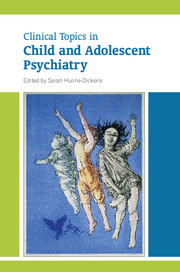Book contents
- Frontmatter
- Contents
- List of tables
- List of boxes
- List of figures
- List of contributors
- Preface
- 1 Child psychiatry and the people who have shaped it
- 2 Fabrication and induction of illness in children
- 3 Personality disorders as disorganisation of attachment and affect regulation
- 4 Post-traumatic stress disorder and attachment: possible links with borderline personality disorder
- 5 Management of antisocial behaviour in childhood
- 6 Pharmacology for attention-deficit hyperactivity disorder, Tourette syndrome and autism spectrum disorder
- 7 Pharmacology for anxiety and obsessive–compulsive disorders, affective disorders and schizophrenia
- 8 Pharmacological management of core and comorbid symptoms in autism spectrum disorder
- 9 Pharmacological treatment of depression and bipolar disorder
- 10 Cognitive–behavioural therapy with children, young people and families: from individual to systemic therapy
- 11 Anxiety disorders
- 12 Somatising: clinical presentations and aetiological factors
- 13 Somatising: management and outcomes
- 14 Evaluating psychological treatments for children with autism
- 15 Attention-deficit hyperactivity disorder: assessment and treatment
- 16 Schizophrenia
- 17 Tourette syndrome
- 18 Sleep disorders
- 19 Self-harm in adolescents
- 20 Adolescent substance misuse: an update on behaviours and treatments
- 21 Eating disorders
- 22 Gender dysphoria in young people
- 23 The psychiatry of children aged 0–4
- Index
11 - Anxiety disorders
Published online by Cambridge University Press: 02 January 2018
- Frontmatter
- Contents
- List of tables
- List of boxes
- List of figures
- List of contributors
- Preface
- 1 Child psychiatry and the people who have shaped it
- 2 Fabrication and induction of illness in children
- 3 Personality disorders as disorganisation of attachment and affect regulation
- 4 Post-traumatic stress disorder and attachment: possible links with borderline personality disorder
- 5 Management of antisocial behaviour in childhood
- 6 Pharmacology for attention-deficit hyperactivity disorder, Tourette syndrome and autism spectrum disorder
- 7 Pharmacology for anxiety and obsessive–compulsive disorders, affective disorders and schizophrenia
- 8 Pharmacological management of core and comorbid symptoms in autism spectrum disorder
- 9 Pharmacological treatment of depression and bipolar disorder
- 10 Cognitive–behavioural therapy with children, young people and families: from individual to systemic therapy
- 11 Anxiety disorders
- 12 Somatising: clinical presentations and aetiological factors
- 13 Somatising: management and outcomes
- 14 Evaluating psychological treatments for children with autism
- 15 Attention-deficit hyperactivity disorder: assessment and treatment
- 16 Schizophrenia
- 17 Tourette syndrome
- 18 Sleep disorders
- 19 Self-harm in adolescents
- 20 Adolescent substance misuse: an update on behaviours and treatments
- 21 Eating disorders
- 22 Gender dysphoria in young people
- 23 The psychiatry of children aged 0–4
- Index
Summary
Anxiety is an uncomfortable experience characterised by emotional (e.g. unease, distress), cognitive (e.g. fears, worries, helplessness), physiological (e.g. muscle tension) and behavioural (e.g. avoidance) changes. The anxious child commonly focuses on the future, fearful of danger, either specific or undefined. Anxiety that is excessive or contextually or developmentally inappropriate, causing significant distress and/or functional impairment, can be classified as an anxiety disorder. Although rarely recognised, too little anxiety might also be considered ‘disordered’: callous unemotional traits may be such a manifestation (Frick et al, 1999).
In ICD-10, anxiety disorders are classified into a cluster of related conditions: separation anxiety, generalised anxiety, social phobia, panic disorder and simple phobias (World Health Organization, 1992). Although beyond the remit of this chapter, anxiety can feature in other psychiatric conditions. In obsessive–compulsive disorder (OCD), obsessions generate anxiety which the individual then tries to neutralise through compulsions. Indeed, DSM-5 defines and differentiates obsessions and compulsions through their causal relationships with anxiety (American Psychiatric Association, 2013). This may be a simplification: although compulsions may initially relieve anxiety, they can aggravate it as the disorder progresses (Heyman et al, 2006). Swedo et al (1998) describe separation anxiety as a characteristic feature of the proposed ‘paediatric autoimmune neuropsychiatric disorders associated with streptococcal infections’ (PANDAS) subset of OCD, although recent research disputes this (Murphy et al, 2012). Anxiety also occurs in post-traumatic stress disorder (PTSD), particularly when traumatic memories are triggered. Avoidance behaviour and hypervigilance are common and can be seen as an adaptive response to avoid further dangers, albeit one that is excessive, distressing and/or impairing. Anxiety in PTSD may relate to dysfunction of the hypothalamic– pituitary–adrenal (HPA) axis.
From an evolutionary perspective, anxiety is an emotional response intrinsically shaped by natural selection: its very purpose is to ensure safety, avoid danger and keep the individual alive (at least long enough to pass on their genes). Anxiety is therefore a normal and important facet of human experience and functioning.
- Type
- Chapter
- Information
- Clinical Topics in Child and Adolescent Psychiatry , pp. 165 - 182Publisher: Royal College of PsychiatristsPrint publication year: 2014



